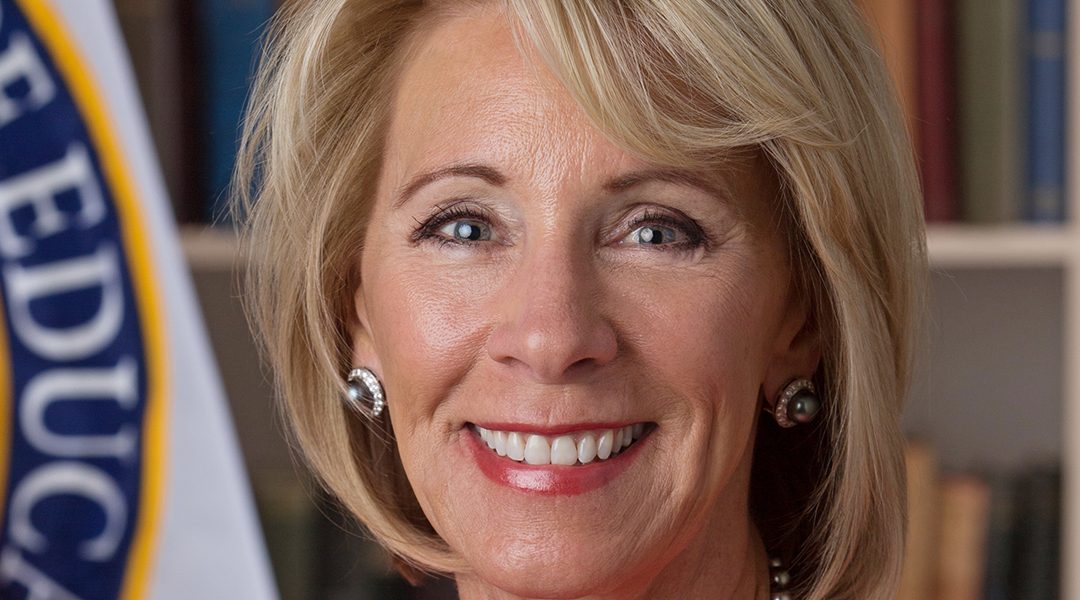
#RethinkSchool: Choice Matters for Military-Connected Students
“There are so many active-duty military families today who are making decisions about how they advance within the military, or where they are going to live… based on educational opportunities for their children,” Secretary DeVos recently said in a conversation with Kay Coles James, president of the Heritage Foundation. “I think we have the opportunity to change the dynamic for them.”
Maddie Shick is from one such family – and, despite being a bright student, she faces challenges that accompany a military-connected lifestyle. A self-proclaimed “professional new girl,” Maddie is now a sophomore at Robinson High School in Tampa, Florida.
 Her formal education began in Georgia, but she’s learned across the country and around the world – even moving to Germany, where her father was deployed, for a year.
Her formal education began in Georgia, but she’s learned across the country and around the world – even moving to Germany, where her father was deployed, for a year.
She’s attended a dozen different schools since preschool – and some of them have provided her with strong opportunities to learn and grow. As a middle school student in Columbus, Georgia, Maddie joined the drama club and performed in West Side Story. The school taught an International Baccalaureate curriculum.
The following year, the family moved to Fairbanks, Alaska, where Maddie had the opportunity to cross-country ski at school. She also joined the wrestling team – and she fell in love with the sport. “Girls can wrestle, too,” Maddie said.
But in Fairbanks, Maddie had to put her love of acting on hold: the school didn’t offer drama, and her family couldn’t find an active children’s theater group in the area.
And when the family next moved to Tampa, Florida, Maddie had to abandon her love of wrestling, too: when she switched schools within the district, she was disqualified from wrestling with her new team.
Maddie took advantage of the opportunity to explore new activities as she moved from school to school – but that also meant giving up ones that she’d once loved.
“There’s good and bad to all these schools,” Maddie said, “But the really bad part is that I don’t ever get to stay long enough to benefit from any one type of school.”
Military-connected students are often required to compromise – on top of the traditional pressures of maintaining good grades, preparing for tests, working, volunteering, and planning for life beyond high school.
“Moving and starting over every two years makes all these pressures worse,” Maddie said. “Now, imagine you have to focus on all these things at three different schools, in three different states, in a four year period. It’s tough.”
Military-connected families deserve the opportunity to attend schools that work for them. They deserve – as the Secretary said – the flexibility to “customize their child’s education.”
That’s why the Secretary has called on all of America to fundamentally rethink school, including asking questions that were once considered “non-negotiable” or too difficult to answer. For example, students like Maddie are often required to fall in line with the pace of a new school – even if she’s ahead of her classmates.
“I was in gifted education for most of elementary school, but when we moved to Alaska I did not qualify for their program,” said Maddie. “Now, I don’t want to even try for gifted programs because I am tired of repeating all the testing every two years and most of the gifted programs are limited anyway.”
Military-connected students and all students should have options – perhaps attending a traditional public school for some classes, and attending an online or charter school for others. Rethinking school means that students, like Maddie, to whom “learning comes easy,” can advance quickly in subject areas that interest them.
“We do live an adventure,” Maddie said. “But some parts are really hard. School is one of them.”
Maddie deserves high-quality opportunities. She deserves the freedom to pursue subjects that interest and challenge her, in an environment that meets her needs.
All students, including those in military-connected families, should be free to learn, grow and thrive.
Continue the conversation on Facebook or Twitter.
Note: This is a post in our #RethinkSchool series. The series features innovative schools and stories from students, parents and educators highlighting efforts across the United States to rethink school. Check back on Thursdays for new posts in the series. The #RethinkSchool series presents examples of approaches schools, educators, families and others are using to rethink school in their individual and unique circumstances. Blog articles provide insights on the activities of schools, programs, grantees and other education stakeholders to promote continuing discussion of educational innovation and reform. The Department of Education does not endorse any educational product, service, curriculum or pedagogy.





 U.S. Secretary of Education Betsy DeVos, who has had difficulty selling her school choice agenda in Washington, railed against state constitutional prohibitions on public funds going to faith-based institutions, in a recent speech to a Roman Catholic organization.
U.S. Secretary of Education Betsy DeVos, who has had difficulty selling her school choice agenda in Washington, railed against state constitutional prohibitions on public funds going to faith-based institutions, in a recent speech to a Roman Catholic organization.
